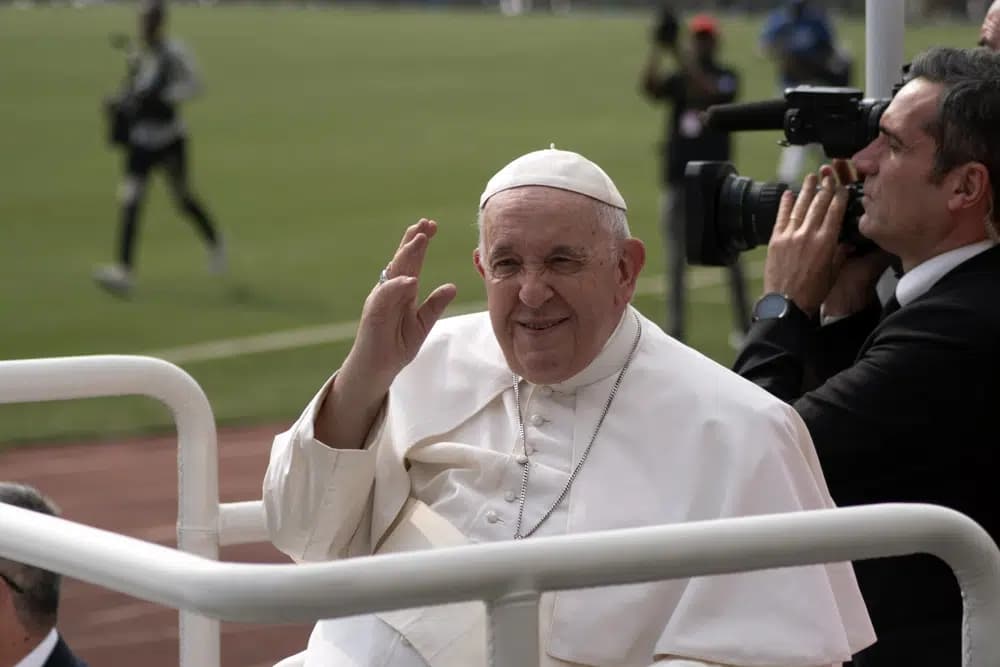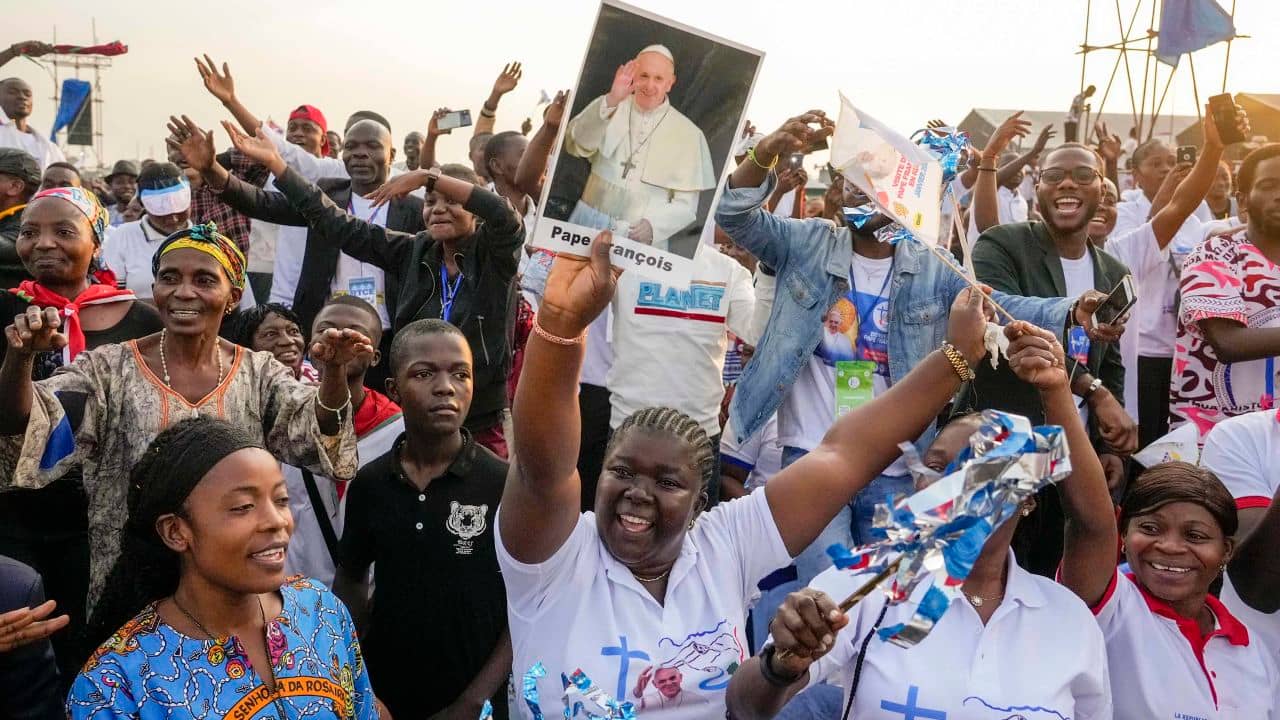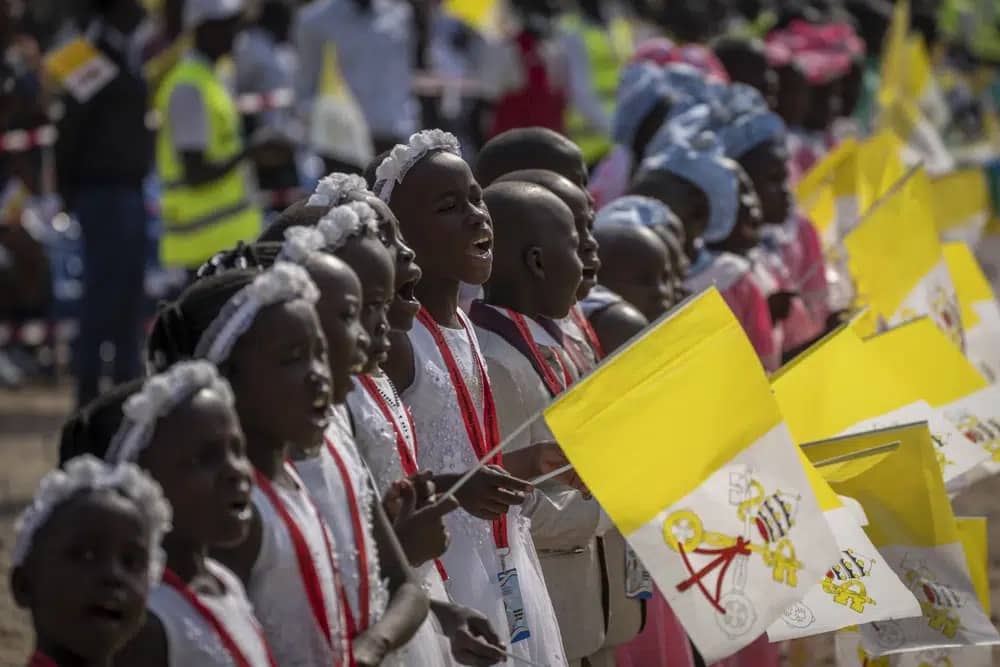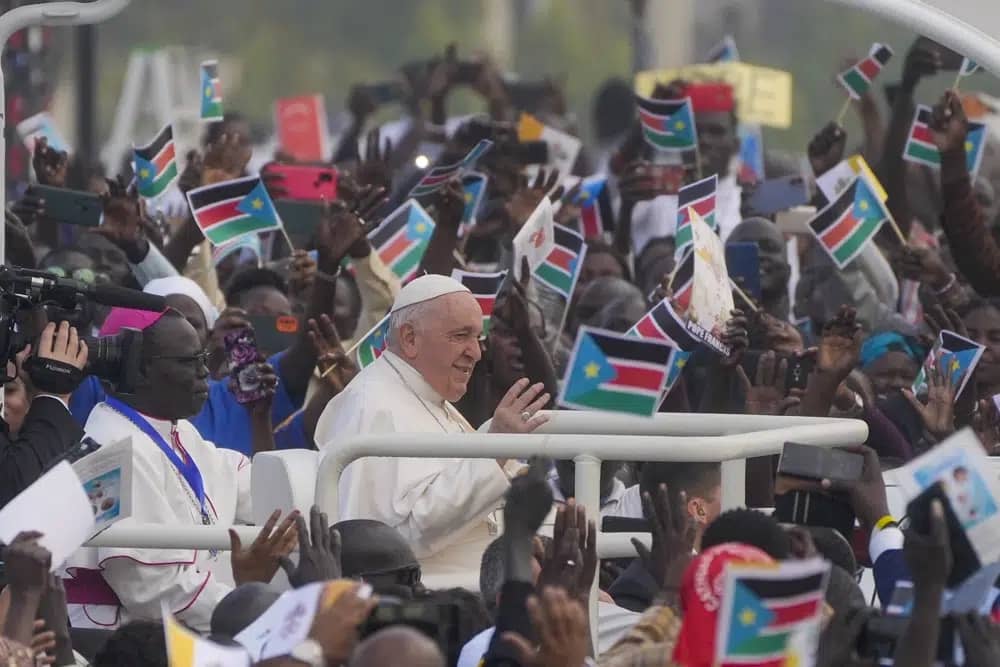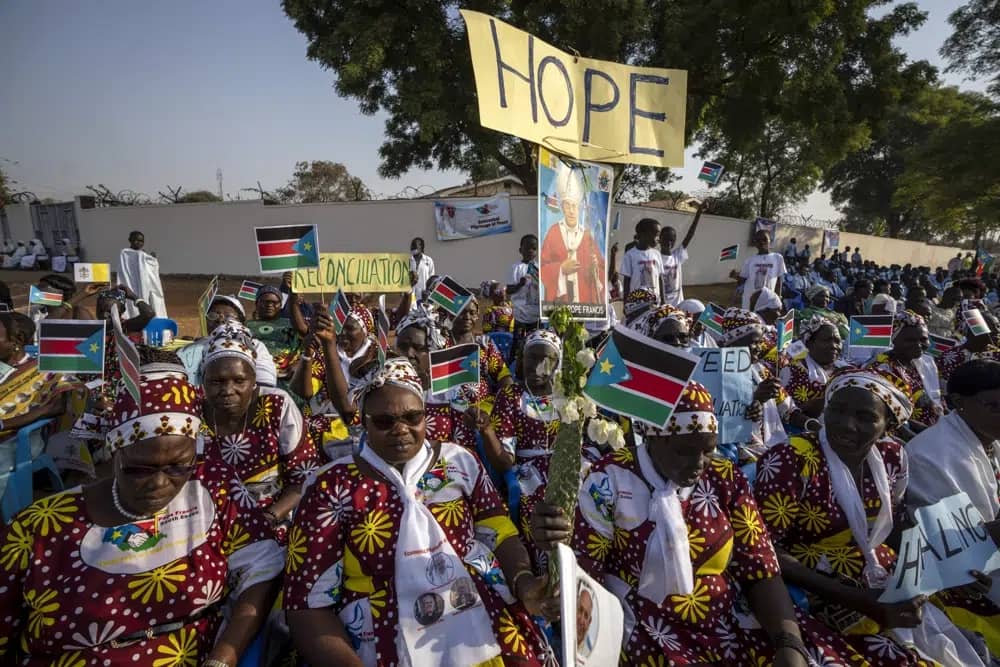KINSHASA – On his last full day in the Democratic Republic of Congo, Pope Francis met Thursday with priests and religious, warning against several temptations to the spiritual life and thanking them for their service to the poor and suffering.
“Dear priests and deacons, consecrated men and women, seminarians: Through you, the Lord also wants to anoint his people today with the balm of consolation and hope,” he said, speaking to the priests, deacons, men and women religious, and seminarians gathered for the Feb. 2 meeting.
“You are called to echo this promise of God, to remind others that he made us and we belong to him, and to encourage and accompany the community’s journey in faith towards the one who always walks at our side,” he said, saying, “God does not allow the waters to overwhelm us, nor the fire to consume us.”
Pope Francis has been in Kinshasa since Tuesday as part of a trip aimed at bringing comfort and encouragement to the people of the DRC, which for decades has been plagued by war, corruption, and rampant poverty despite its mineral-rich soil, making it one of the world’s leading producers of diamonds and cobalt, among other things.
He will travel to South Sudan, which has also been plagued by years of violent conflict, on Friday, offering citizens a similar message of peace and proximity.
After meeting with Congolese youth and the DRC’s Prime Minister, Sama Lukonde, earlier that day, Francis Wednesday afternoon met with the priests and religious who serve the country’s roughly 45 million Catholics.
According to Vatican statistics, there are currently 6,162 priests in the DRC, most of whom are diocesan priests serving in parishes, and 1,317 non-ordained religious men. Religious women make up the bulk of consecrated vocations in the DRC, numbering at 10,525.
One of the largest Catholic countries in Africa, there are estimated to be 8,466 Catholics in Congo for every priest, with over 10,000 men currently studying for the priesthood in major or minor seminaries throughout the country.
In his speech, held at the Notre Dame du Congo cathedral in Kinshasa, Pope Francis noted that priests and religious face “enormous challenges” in their ministry, and often find themselves in difficult and dangerous situations surrounded by immense suffering.
“Yet there is also an abundance of great joy in the service of the Gospel, and vocations to the priesthood and consecrated life are plentiful,” he said, saying this a result of God’s grace, which he said is “capable of generating hope in the often-painful situations in which your people live.”
“God opens new paths in the midst of our deserts, and we, as ordained ministers and consecrated persons, are called to be a sign of this promise and to help bring it to fulfilment in the history of God’s holy people,” he said.
The consecrated life, he said, is not simply a profession or a social status, but is rather “a mission to act as signs of Christ’s presence,” love, and mercy.
Pope Francis highlighted several challenges he said can arise in living out a consecrated vocation, including the temptation to “spiritual mediocrity,” which he said can be overcome by maintaining a strong spiritual life.
He stressed the importance of consistent daily prayer, and urged them to turn to structured prayers such as the Liturgy of the Hours, as well as Mass and regular Confession. He also spoke of the importance of having private moments of adoration for “heart-to-heart” conversation with God.
Another temptation he cautioned against was that of pursuing worldly comfort or craving “the easy life, in which we more or less arrange everything and stand back, seeking our own comfort, dragged along without enthusiasm.”
“In this way, we lose the very heart of our mission, which is to put our ego behind us and to set out towards our brothers and sisters, practicing, in the name of God, ‘the art of closeness,’” he said.
Francis told the priests and religious to be careful not to become “cold bureaucrats of the spirit,” concerned more with finances and turning a profit in business affairs than spreading the Gospel.
“It is scandalous when this happens in the life of a priest or religious, for they should instead be models of sobriety and inner freedom,” he said, saying it is beautiful “to be transparent in our intentions and free from compromise with money, joyfully embracing evangelical poverty and working side by side with the poor!”
The pope also acknowledged and praised the sacrifice of maintaining priestly celibacy, saying, “how beautiful it is to be radiant in living celibacy as a sign of complete availability to the kingdom of God!”
Pope Francis warned against a third temptation in the consecrated life, which he said is the temptation to superficiality, and lacking any spiritual or intellectual depth in teaching others about the faith.
“The People of God are waiting to hear and find consolation in the word of the Lord. Consequently, they need priests and religious who are educated, well trained and passionate about the Gospel,” he said, but cautioned against becoming “sacred functionaries” with a stack of academic degrees while out of touch with the men and women they serve.
While academic training is important, what the people need, he said, is for their pastors “to remain open to the problems of our time and the increasingly complex questions of our age, in order to understand people’s lives and needs, and to realize how best to take them by the hand and accompany them.”
Francis stressed the importance of setting a personal example in living the faith, saying, “words and intentions are not enough: your lives must speak louder than your words.”
He praised their dedication to the poor and suffering, and said more vocations to the consecrated life are needed to provide people “closeness and consolation, like a light that keeps shining amid the encircling gloom.”
Through their lives, he said, priests and religious in the DRC must go beyond traditional prejudices and divisions and be “brothers and sisters to all, especially to one another: witnesses of fraternity, never at war; witnesses of peace, learning how to live with differences between various cultures and ethnic backgrounds” in a place where tribal and ethnic differences are often expressed with violence.
Pope Francis closed telling the priests and religious not to be discouraged by the challenges of their work, “because we need you!”
“You are precious and important. I say this in the name of the whole Church. May you always be channels of the Lord’s consoling presence, joyous witnesses of the Gospel, prophets of peace amid the storms of violence, disciples of love, ever ready to care for the wounds of the poor and suffering,” he said.
Follow Elise Ann Allen on Twitter: @eliseannallen
